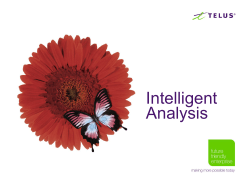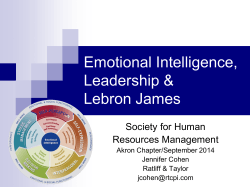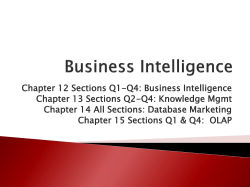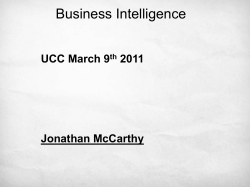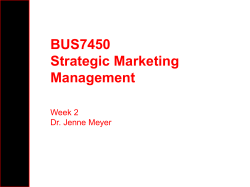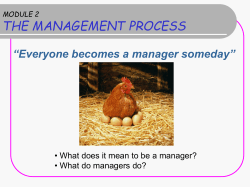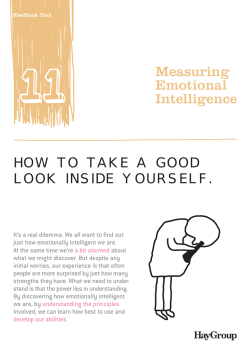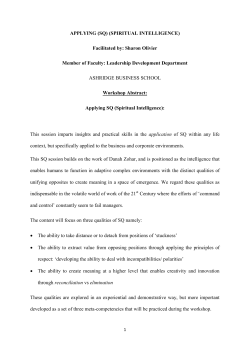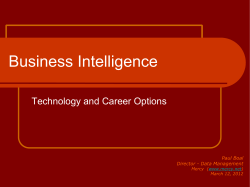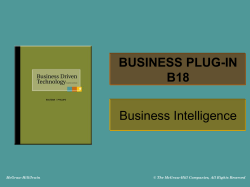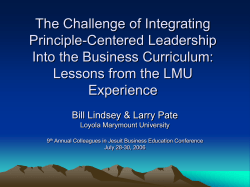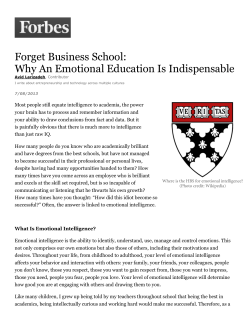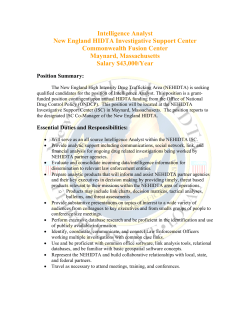
Document 235859
EMOTIONAL INTELLIGENCE (EQ) What is emotional intelligence? 'The ability to monitor one's own feelings and emotions, to discriminate among them and to use this information to guide one's thinking and action' (Salovey & Mayer 1990) I n other words... it's about: • Knowing how you and others feel and what to do about it • Knowing what feels good, what feels bad and how to get from bad to good • Possessing emotional awareness, sensitivity and the management skills that will help to maximise long-term happiness and survival What are the origins of EQ? Originally coined in 1990 by two US psychologists, Peter Salovey and John Meyer, EQ refers to a learned ability to perceive, understand and express our feelings accurately and to control our emotions so that they work for us and not against us. In 1995, the publication of Daniel Goleman's book, `Emotional Intelligence: Why It Can Matter More Than IQ' introduced the words `emotional intelligence' and the term has entered common management-speak with unprecedented speed. Why is it important? It was Aristotle, the 4th BC thinker and philosopher, who spoke of a rare ability, `to be angry with the right person, to the right degree, at the right time, for the right purpose and in the right way.' There is building evidence that in today's working environment, you don't just need to be intelligent; you need to be emotionally intelligent. Recent research in the US and the UK suggests that those successful leaders who are at the top of their profession are more emotionally intelligent that those below them and that many people in organisations who have a well-developed sense of EQ suffer from less stress, enjoy better health, possess higher self-confidence and overall perform better. Those who are more aware tend to step back in moments of emotional crisis to reflect and are more likely to enter into dialogue rather than harangue! The higher you look in an organisation, the less critical technical and analytical skills become and the more important EQ competencies become in distinguishing the outstanding performers. Can it be learnt? Again, research suggests that unlike IQ, which is largely genetic and changes little from childhood, the skills of EQ can be learnt at any age. How can I learn more about it? There are many different 'models' that deal with roughly the same types of topics. One of these deals with a 'five-step model' (Margaret Chapman: Emotional Intelligence Pocketbook 2001) 1 40 1, The core capabilities ,<- Self-awareness: The ability to see ourselves with our own eyes and tuning into our senses and feelings. Emotion management: Controlling those unproductive behaviours that don't get us anywhere and understanding the link between out own interpretation of an event and our responses to it. Self-motivation: Being positive through words and actions and creating the right environment to move forward. Relationship management: `The ways that pe ople treat us are reflections of the ways we treat ourselves' (Linda Field: The Self-Esteem Workbook). Realise and accept that you can't change other people; all you can do is change , yourself. If you keep on doing what you have always done, you will keep on getting what you have always got! Emotional coaching: Help others to develop their emotional capabilities, resolve differences, solve problems, communicate effectively and become motivated. And finally... ` Managers need to change their whole approach to managing and instead of relying on systems and control procedures, need to get to know and trust their people as individuals... Direct personal contact and coaching keeps managers apprised of real business challenges and provides an opportunity to shape responses through a shared understanding. The new corporation is the individualised corporation'. (Goshal & Bartlett: Harvard Business Review, May/June 1995) 2 ASSESSING AND DEVELOPING YOUR EMOTIONAL INTELLIGENCE For each question, tick the box that comes closest to how you feel about the answer 1 ASSESSING AND DEVELOPING YOUR EMOTIONAL INTELLIGENCE i 2 ASSESSING AND DEVELOPING YOUR EMOTIONAL INTELLIGENCE Marking your answers Give yourself 4 points for each box ticked in Column A; 3 points for each box ticked in column B; 2 for C and 1 for D. Enter the scores in the boxes below and fill in the totals. Question If you scored 17 or more, then you are quite emotionally intelligent already. A score of 13-16 means that some slight remedial work is necessary. A score of 12-9 means you must roll up your sleeves! A score of 8 or less means, oh, dear! But do not despair whatever your score. Now that you have a greater understanding of what emotional intelligence means, you can now take steps to develop it within yourself. Good luck! 3
© Copyright 2025

